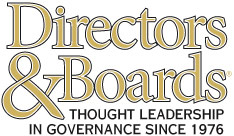Ed. Note: Here is what best practices in board composition look like from the perspective of an expert in turnarounds and change management. Roger Sweeney is managing partner of SMB lnterim Management LLC (www.smbim.com). The Chicago-based firm provides C-level interim executives. Often On short notice, who step in to address a company's critical operational needs. These companies can be facing significant potential loss of shareholder value stemming from management issues, regulatory challenges, post-merger integration problems, a need to restructure underperforming assets, or other transitional business issues that cannot be optimally addressed by the existing management team or board of directors.
Sweeney has been personally involved with over 100 successful turnaround situations. He has operating experience as president and CEO of several manufacturing companies, in addition to senior roles at Procter & Gamble, Avon Products, General Electric, and McKinsey & Company.
It is not uncommon these days to read a I report or hear a story on the news that tells the tale of a failing business, corruption in the marketplace, or an economy in turmoil. Along with these stories often comes criticism of the CEO, senior management, or other leadership - namely, the board of directors. lt is, of course, easy to jab at the ones in charge. The weight of decisions falls on their shoulders.
That is why having leaders who meet the following criteria on your board can be critical to navigating through uncharted or choppy waters as the economy hopefully starts to surge again soon.
1. An individual with a background in the industries/businesses served: The individual I would provide strength to your weakness by defusing potential "conventional wisdom" mistakes regarding target customers and the marketplace. This individual can also stimulate creative thinking and "one-off" approaches to penetrate new markets.
2. A current executive or an "active up-to-date" former executive: A person of this stature understands typical C-suite issues faced in managing a business, is familiar with typical board roles and responsibilities and their potential impact on operations and executives, and is used to making executive trade-off decisions facing requirements imposed by financial/operating realities.
3. Knowledgeable on market and business trends, new developments, and "opportunities ": When a person has real world, versus theoretical, experience, it makes a world of difference. 0ften this means he/she understands business cycles and how to find potential opportunities that may result from them. Furthermore, this board member can use his/her real world knowledge to cite examples from the past.
4, Broad business/governance background: An individual with this type of background understands the effects of such policies such as Sarbanes-Oxley and Dodd-Frank regulations. ln addition, he/she is familiar with the legal and fiduciary responsibilities of board members.
5, Well-connected and preferably "well known" in his/her field: This individual can bring stature and recognition to the board if that is desired or deemed necessary by the company. Furthermore, this board member can provide opportunities for PR, press, and governmental relations purposes that may have otherwise fallen to the wayside.
6. Approachable and available: A person with these qualities is collegial and easy to work with which builds bridges, solves problems, and does not create barriers to solutions.
7. 0ne who will roll up their sleeves and pitch in in a timely manner: This is an individual who has the time available and is willing to do the work required.
8. Understands how boards function: He or she understands roles, committee structure and functions, confidentiality, and board policies and dynamics - all of which are crucial in serving as an important and valued member.
9. Has good manners: An individual with good manners is always on time, knows not to use a smart phone during meetings, does not doze off. Does not read other materials during the meeting, etc. While this may sound like the most basic quality of them all, good manners, unfortunately, are not always given the consideration they deserve.
10. Has a good grasp of U.S. business basics, laws, and strategic planning: Understanding basic business laws and strategic planning will give your board a leg-up in planning for the future, in creating legacy plans and in ensuring your business's success.
The foundation for the long-term success of a corporation is in the strength of its board of directors. Highly qualified directors exhibit these 10 qualities, which set the standard for the management team and reputation of the company.
